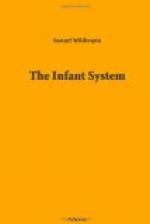“To lead them into virtue’s
path,
And up to truth divine.”
If we had only to educate the head, prayer might be less necessary. But the promoters of infant schools want to affect the heart; to operate upon the will and the conscience, as well as on the understanding; to make good men rather than learned men—men of wisdom, rather than men of knowledge: and he who has this work to accomplish, should remember the Saviour’s declaration, “Without me ye can do nothing.” Whilst therefore I would avoid too frequent repetition of the divine names in tire presence of the children, and never fail to let them know the difference between talking religion and doing religion, and in every case avoid the very appearance of the form without the essence, I would in such case, avoid long prayers, and take care that what was said in their presence should be short, and to the point, keeping in mind the scripture maxim, to avoid long repetitions as the heathen do, who think they shall be heard for their much speaking; and little children cannot have the simple truths of the Word pourtrayed to them in too simple a manner.
To use prayers with little children composed of hard words taken from scholastic theology, is contrary to common sense. How is it possible that they can either understand or feel them? To utter prayer before them in dull and melancholy tones, and with grimaces of countenance, is calculated to give a false and gloomy impression of religion, and has often done so. I have known little children alarmed and frightened at such things; for sounds and appearances speak more strongly to them than words.—Christ said of the Pharisees, “they disfigure their faces.” Our Saviour’s direction is, after this manner, pray ye—“Our Father,” thus directing us to draw near to the Most High God as a heavenly father, rich in mercy to all them that call upon him. True, indeed, it is that “all have sinned,” but a “new and living way” is provided whereby we may “draw near with boldness to a throne of grace to obtain mercy and find grace to help in time of need.” Cowper never penned a truer line than this;
“True piety is cheerful as the day;”
and such an impression of it should ever be given to the young. The best prayer of a master for his children, is the perpetual and strong desire of his heart for God’s blessing upon them, which, when genuine and sincere, will without doubt be recorded on high, and will also urge him on to a faithful and unceasing discharge of his duties towards them. To possess this is indeed to “pray without ceasing,” and will prevent an unnecessary multiplication of “long prayers,” “vain repetitions,” and “much speaking.”
But to proceed. The children being assembled, should be desired to stand up, and immediately afterwards to kneel down, all close to their seats, and as silently as possible: those who are not strong enough to kneel, may be allowed to sit down. This being done, a child is to be placed in the centre of the school, and to repeat the following prayer:—




